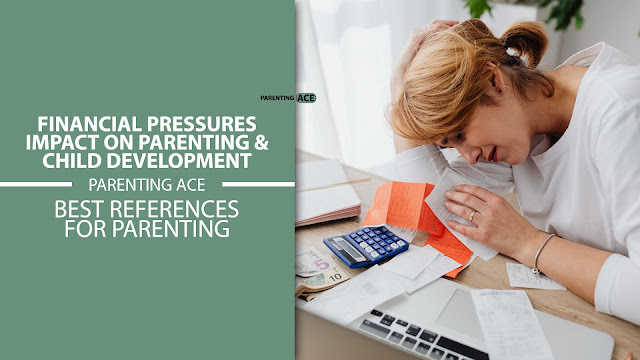Navigating Financial Pressures: The Impact on Parenting and Child Development
Parenting is a journey filled with profound responsibilities and joys, yet it also presents numerous challenges, including the formidable hurdle of financial pressures. In this blog post, we delve into the intricate relationship between financial stressors and parenting dynamics, exploring how economic instability impacts family dynamics, parental well-being, and ultimately, the development of children. By understanding the complexities of navigating financial pressures within the realm of parenting, we aim to shed light on strategies for fostering resilience, maintaining stability, and promoting positive outcomes for both parents and children amidst economic challenges.
 |
| Financial Pressures: Impact on Parenting & Child Development |
Parenting is a journey filled with joys, but it also comes with its fair share of challenges. Among these challenges, financial pressures stand as a formidable external stressor that can significantly impact parenting dynamics and, consequently, children's development. In this article, we delve into the complexities of financial pressures within the realm of parenting, exploring its effects on family dynamics, parental well-being, and the long-term outcomes for children.
Understanding Financial Pressures
Financial pressures encompass a myriad of stressors, including insufficient income, debt burdens, job instability, and unexpected expenses. These pressures can lead to feelings of anxiety, frustration, and inadequacy among parents, as they struggle to meet the financial needs of their families while striving to provide a nurturing and stable environment for their children.
Impact on Parenting
The impact of financial pressures on parenting is profound and multifaceted. In many cases, parents may find themselves juggling multiple jobs or working long hours to make ends meet, leaving them with limited time and energy to engage meaningfully with their children. Moreover, the stress and anxiety stemming from financial instability can strain parent-child relationships, leading to conflicts, communication breakdowns, and feelings of resentment.
Furthermore, financial pressures may influence parenting styles and decision-making processes. For instance, parents experiencing financial strain may resort to authoritarian or permissive parenting styles as they struggle to maintain control or seek to compensate for their inability to provide material comforts. Additionally, financial constraints may force parents to make difficult choices regarding childcare, education, and extracurricular activities, potentially impacting children's opportunities for enrichment and development.
Effects on Child Development
The ramifications of financial pressures on children's development are far-reaching. Economic hardship has been linked to adverse outcomes such as poor academic performance, behavioral problems, and compromised mental health. Children growing up in financially stressed households may experience heightened levels of stress themselves, negatively impacting their cognitive abilities, emotional regulation, and social interactions.
Moreover, financial instability can exacerbate existing disparities in access to resources and opportunities, widening the gap between socio-economic groups and perpetuating cycles of poverty and disadvantage. This disparity not only affects children's current well-being but also shapes their future prospects and life trajectories.
Addressing Financial Pressures
Addressing financial pressures requires a multi-faceted approach that encompasses both individual and systemic interventions. On an individual level, parents can benefit from financial literacy education, budgeting strategies, and access to support networks that provide assistance with managing debt and accessing resources. Additionally, cultivating resilience, communication skills, and healthy coping mechanisms can help parents navigate financial challenges while maintaining positive parent-child relationships.
At a systemic level, policymakers and community stakeholders play a crucial role in implementing policies and programs that address economic inequality, promote family-friendly workplaces, and provide equitable access to essential services such as healthcare, education, and childcare. By addressing root causes of financial instability and supporting families in need, society can mitigate the impact of financial pressures on parenting and foster environments conducive to children's healthy development.
Financial pressures pose significant challenges for parents, impacting their ability to provide nurturing and supportive environments for their children. The interplay between financial stress, parenting dynamics, and child development underscores the need for comprehensive support systems that address the underlying causes of economic hardship and promote resilience within families. By addressing financial pressures and fostering environments that prioritize the well-being of both parents and children, we can create a more equitable society where every child has the opportunity to thrive.



Comments
Post a Comment